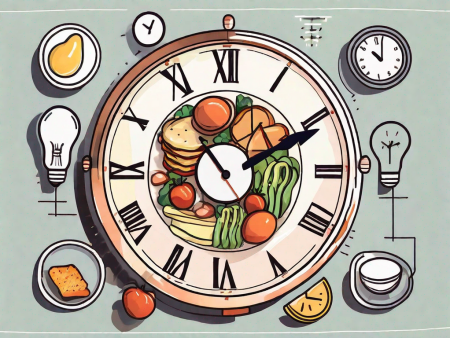Discover the surprising ways that stress can impact your weight during middle age.
How Stress Influences Weight in Middle Age
In today’s fast-paced world, stress seems to be unavoidable. Whether it’s due to work deadlines, financial pressures, or family responsibilities, stress can affect us all. But did you know that stress can also have a profound impact on our weight, especially as we enter middle age? In this article, we will dive deep into the fascinating connection between stress and weight gain, exploring the biological mechanisms at play, the role of age, the impact of chronic stress, and effective coping strategies. So buckle up and get ready to explore this weighty subject!

Understanding the Connection Between Stress and Weight
Before we delve into the nitty-gritty details, let’s first take a closer look at the connection between stress and weight. It turns out that stress doesn’t just affect our mental and emotional well-being; it can also wreak havoc on our physical health. One of the primary ways in which stress influences weight is through the intricate biological mechanisms in our bodies.
When we experience stress, our bodies release a hormone called cortisol, also known as the “stress hormone.” Cortisol plays a crucial role in regulating our body’s response to stress. However, when stress becomes chronic or prolonged, cortisol levels remain elevated for extended periods. This can lead to a range of negative effects on our health, including weight gain.
High levels of cortisol can stimulate the appetite, especially for foods high in sugar and fat. This can lead to overeating or making poor food choices, which can, in turn, result in weight gain. Additionally, cortisol can also promote the storage of fat, particularly in the abdominal region, increasing the risk of developing a potbelly.
But how exactly does stress impact our eating habits? Well, it turns out that stress doesn’t just mess with our hormones; it also affects our eating habits. When we’re stressed, we’re more likely to turn to comfort foods for solace. These foods are often high in calories and low in nutritional value, providing temporary relief but contributing to weight gain in the long run.
Moreover, stressful situations can disrupt our eating patterns. Some people may lose their appetite completely, while others may engage in emotional eating as a coping mechanism. This rollercoaster in eating behaviors can throw off our body’s natural rhythm, making it harder to maintain a healthy weight.
So, it’s not just about the biological mechanisms at play; our psychological response to stress also plays a significant role in weight management. Understanding the connection between stress and weight is essential for developing effective strategies to maintain a healthy lifestyle.
Now that we have a better understanding of how stress impacts our weight, let’s explore some practical tips for managing stress and maintaining a healthy weight.
The Role of Age in Stress and Weight Gain
Now that we have a better understanding of how stress and weight are interconnected, let’s explore how age factors into the equation. Middle age brings with it a host of changes, both biological and lifestyle-related, that can impact our stress levels and, subsequently, our weight.
One of the significant factors that come into play during middle age is the hormonal changes that occur in our bodies. As we age, our hormone levels undergo significant fluctuations, which can have a profound impact on our stress and weight. In particular, women experience menopause, a stage marked by a decline in estrogen levels. This hormonal shift can lead to increased stress and weight gain, especially in the abdominal area. Men, too, face changes in hormone levels, albeit to a lesser extent, which can also contribute to weight gain.
Aside from hormonal changes, middle age often coincides with numerous lifestyle factors that can contribute to stress and weight gain. Balancing career demands, family responsibilities, and other commitments can leave little time for self-care, leading to heightened stress levels and, consequently, weight gain. The constant juggling of multiple roles and responsibilities can take a toll on our mental and physical well-being, making it challenging to maintain a healthy weight.
Furthermore, as we age, our metabolism naturally slows down. This decrease in metabolic rate can make it easier to gain weight and harder to shed those extra pounds. When combined with increased stress, this can create a perfect storm for weight gain in middle age. The body’s ability to burn calories efficiently decreases, making it more challenging to maintain a healthy weight.
It is important to note that stress and weight gain in middle age are not solely determined by age-related factors. Each individual’s circumstances and lifestyle choices play a significant role in determining their stress levels and weight. However, understanding the impact of age-related changes can help us navigate this stage of life with greater awareness and make informed choices to support our overall well-being.
The Impact of Chronic Stress on Weight
Now, let’s shift our focus to the dangers of chronic stress and its impact on our weight. Chronic stress refers to prolonged periods of intense stress without sufficient relief or relaxation. Unfortunately, the effects of chronic stress on our health can extend far beyond just our weight.
Chronic stress not only affects our mental and emotional well-being but also has a profound impact on our physical health. One of the key areas where chronic stress takes a toll is our metabolism. When we’re under chronic stress, our body’s delicate balance is disrupted, affecting various physiological processes, including metabolism.
Our metabolism plays a crucial role in maintaining a healthy weight. It is responsible for converting the food we eat into energy and determining how efficiently we burn calories. However, when we’re constantly stressed, our metabolism may slow down, making it harder to burn calories effectively. This can lead to weight gain over time, even if we’re not consuming excessive amounts of food.
In addition to the impact on metabolism, chronic stress can also influence our eating habits. Many people turn to food as a coping mechanism when they’re stressed, seeking comfort in sugary or high-fat foods. These unhealthy eating habits, combined with the slowed metabolism, can further contribute to weight gain.
Stress-Induced Weight Gain vs. Weight Loss
Interestingly, while some people may experience weight gain due to chronic stress, others may actually lose weight. Stress-induced weight loss can occur as a result of decreased appetite, increased energy expenditure, or the development of unhealthy habits such as skipping meals.
When we’re stressed, our body releases stress hormones like cortisol, which can suppress our appetite. This can lead to a decrease in food intake and subsequent weight loss. Additionally, chronic stress can increase our energy expenditure as our body tries to cope with the constant state of alertness. However, it’s important to note that this weight loss is often not sustainable and can have adverse effects on our overall health.
Skipping meals or engaging in disordered eating patterns as a response to chronic stress can also lead to weight loss. However, these behaviors can be detrimental to our well-being, as they deprive our bodies of essential nutrients and can disrupt our body’s natural balance.
It’s crucial to recognize that both stress-induced weight gain and weight loss can have negative consequences for our health. Whether we’re gaining or losing weight, chronic stress takes a toll on our overall well-being and can increase the risk of developing various health conditions, including cardiovascular diseases and mental health disorders.
In conclusion, chronic stress has a significant impact on our weight. It can disrupt our metabolism, leading to weight gain, or cause weight loss through decreased appetite or unhealthy habits. However, it’s important to prioritize our mental and physical well-being by finding healthy ways to manage and reduce stress levels.
Coping Strategies for Stress Management
Now that we’ve explored the detrimental effects of stress on weight, it’s time to arm ourselves with effective coping strategies for stress management. While we may not be able to eliminate stress entirely from our lives, we can certainly learn how to navigate it more effectively.
Stress is an inevitable part of life, but it doesn’t have to control us. By implementing healthy coping mechanisms, we can minimize its impact on our overall well-being. Let’s dive deeper into some strategies that can help us combat stress and maintain a healthy weight.
Healthy Eating Habits to Combat Stress
One of the best ways to combat stress-related weight gain is through healthy eating habits. Incorporating a diet rich in fruits, vegetables, whole grains, and lean proteins can provide our bodies with the necessary nutrients to combat stress and boost overall well-being.
When we’re stressed, it’s tempting to reach for comfort foods that are often high in sugar and unhealthy fats. However, these foods can actually exacerbate stress and lead to weight gain. Instead, we should focus on nourishing our bodies with foods that support our mental and physical health.
In addition, practicing mindful eating can help us tune in to our body’s hunger and fullness cues, preventing overeating and emotional eating. Taking the time to savor each bite and eat without distractions can make a world of difference in managing stress and maintaining a healthy weight.
Furthermore, certain foods have been shown to have stress-reducing properties. For example, dark chocolate contains antioxidants that can help lower stress hormones, while foods rich in omega-3 fatty acids, such as salmon and walnuts, can reduce inflammation and promote a sense of calm.
The Importance of Regular Exercise
Another powerful tool in our arsenal against stress and weight gain is regular exercise. Engaging in physical activity not only releases endorphins, our body’s natural mood-boosting chemicals, but also helps burn calories and manage stress levels effectively.
Exercise doesn’t have to be a chore; it can be an enjoyable and fulfilling part of our daily routine. Find an exercise routine that suits your interests and schedule, whether it’s going for a jog, hitting the gym, practicing yoga, or joining a dance class. The key is to choose activities that you genuinely enjoy, as this will increase the likelihood of sticking to your exercise regimen.
When we exercise, our bodies release endorphins, which are known as “feel-good” hormones. These endorphins interact with receptors in our brain, reducing our perception of pain and triggering positive feelings in the body. Regular exercise can also improve our sleep quality, boost our energy levels, and enhance our overall mood.
Aim for at least 150 minutes of moderate-intensity exercise per week, and you’ll be well on your way to managing stress and maintaining a healthy weight. Remember, exercise is not just about physical fitness; it’s also a powerful tool for mental and emotional well-being.
In conclusion, stress management and maintaining a healthy weight go hand in hand. By adopting healthy eating habits and incorporating regular exercise into our lives, we can effectively combat stress and its negative impact on our bodies. Let’s prioritize our well-being and take proactive steps towards managing stress in a healthy and sustainable way.
The Long-Term Effects of Stress on Body Weight
Lastly, let’s explore the long-term effects of stress on body weight, particularly its relationship with obesity and other health conditions.

Stress and Obesity
Chronic stress can significantly increase the risk of obesity. The continuous release of cortisol, along with the various behavioral changes associated with stress, creates a perfect storm for weight gain. Obesity, in turn, increases the risk of developing other health conditions such as heart disease, diabetes, and certain types of cancer.
Stress and the Risk of Other Health Conditions
Furthermore, stress has been linked to a range of other health conditions beyond obesity. Research suggests that chronic stress can weaken the immune system, disrupt sleep patterns, and increase inflammation in the body. These factors can contribute to a host of health problems, including cardiovascular disease, depression, anxiety, and digestive disorders.
Conclusion
As we’ve discovered, the connection between stress and weight in middle age goes far beyond simple mind-body interplay. Stress affects our bodies on a biological level, disrupting hormones and eating patterns. Age-related changes and lifestyle factors further compound the issue, making it essential to adopt healthy coping strategies. By embracing healthy eating habits, incorporating regular exercise, and actively managing stress, we can navigate these murky waters and maintain a healthy weight well into middle age and beyond. So, take charge of your stress, and watch those extra pounds melt away!








MGMT unmethylated 93 bp; MGMT methylated 8l bp; U unmethylated; M methylated; PM Positive control of methylated PCR reaction; PU Positive control of unmethylated PCR reaction; N Negative control; MM molecular marker priligy side effects